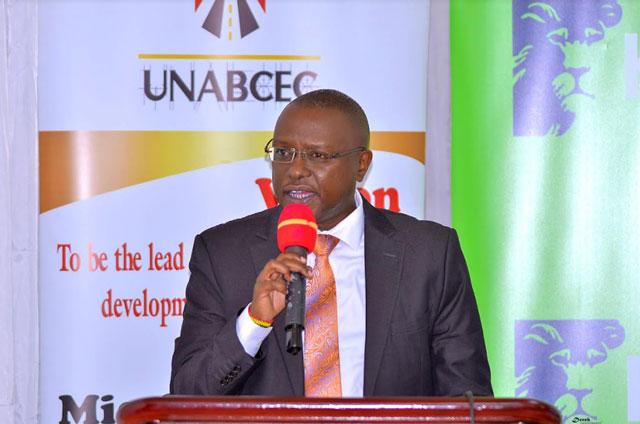
Kampala, Uganda | THE INDEPENDENT | Contractors have been tipped on how to prepare and take up opportunities in the Oil and Gas sector. This was during the Uganda National Association of Building and Civil Engineering Contractors (UNABCEC) CEO Breakfast meeting at Hotel Africana under the theme Contractors Readiness to Undertake Projects in the Oil and Gas Sector.
“For the Oil and Gas sector to deliver meaningful value to firms in the construction sector, there is a need to educate, train, and sensitize the public on the existing prospects as well as provide affordable financial support to them through financial institutions like; KCB Bank Uganda to enable them to make their contribution to the sector. Finance continues to be a fundamental aspect that facilitates the smooth operation of small and large enterprises in equal measures. It’s therefore key that the banking industry designs and provides financial products and services that suit the needs of players in the construction sector like we have done for others in supporting sectors,” noted, KCB Bank Uganda, Managing Director Edgar Byamah at Thursday’s Breakfast meeting.
Byamah applauded UNABCEC for hosting engagements like the CEO Breakfast meeting, a forum where different sector players can learn, re-learn or unlearn, by borrowing experiences and knowledge from experts on what can be adopted to foster growth in the sector.
In his remarks, JamesOne Olonya, UNABCEC President revealed, “There are continuous unprecedented pressures of running a company, and when we look at the construction industry, it is faced with numerous technicalities and difficulties than the average business, thus there is need to employ measures that safeguard against any unforeseen situations that might cripple smooth operation.”
Olonya added, “A Contractor who is able to forecast their business, can build long-term resilience through Key Performance Indicators (KPIs) which a business can use to track, analyze and understand its operations. These KPIs can be interpreted as; Key, which addresses the prioritization of metrics, Performance which indicates the ways a company operates or behaves, and lastly, Indicator which shows the quantitative data, such as numbers or percentages. These present a quick picture of a condition and its favorable or non-favorable status, while also meeting the Short-term financial goal.”
Delivering his keynote speech, Private Sector Foundation Uganda (PSFU) Dr. Elly Karuhanga,the Key note speaker said, “The Financial Investment Decision (FID) announced at the start of the year was a significant milestone in Uganda’s history, as this will greatly boost the country’s socio-economic transformation and development through the immense opportunities it presents.”
He further stated, “To fully utilize these opportunities, we need to address the capacity gap by skilling and empowering individuals plus organizations who are taking on or will take on these projects. The sector is sensitive as there are a number of formalities that have to be met, including health, safety and proper documentation of bids. In addition, collaborative efforts should be championed between local and foreign contractors if we are to scale up the sector’s performance.”
According to KCB Bank Uganda’s Head of Corporate Banking, Ramla Nantongo Munyakazi, the bank is cognizant of the high cost of operating in the Oil and Gas sector, which makes collaboration in the banking industry, among other stakeholders vital as it enables the provision of the needed support including financial support.”
“In line with Uganda’s agenda of developing the Oil and Gas industry, there is a need for sufficient working capital for both the contractor and sub-contractors to ensure the projects do not stall. KCB Bank Uganda has an Asset financing package of up to 80% of the asset value, with a tenure pegged to the monthly or quarterly payments or as per the payment cycle secured by the asset” Nantongo concluded.
 The Independent Uganda: You get the Truth we Pay the Price
The Independent Uganda: You get the Truth we Pay the Price


